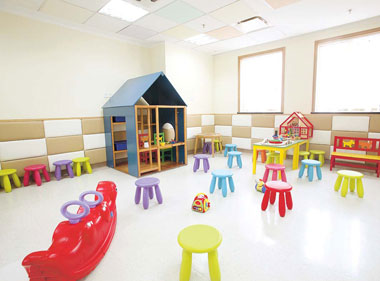|

|
|
The bright and colorful surroundings at Shanghai Children's Medical Center are designed to put even the most nervous of young patients at ease.
|
A mini slide stands in the corner, toy bricks are scattered on a small table with colorful plastic stools all around. But this is no kindergarten playroom. It's the registration hall of the Special Service Clinic at Shanghai Children's Medical Center, providing medical services for expat children in Shanghai.
Though this may be common in many clinics abroad, it is rare in local hospitals, says Dr Huang Xiaodong, the clinic's director. The department also provides private consulting rooms.
"We are trying to provide a medical environment similar to those in the expats' hometowns," Huang says. "The play area and colorful decorations will help the children feel at ease, while the private rooms will help protect each patient's privacy."
The clinic, first established in 2001, is now receiving an average of 50 children of different nationalities every day.
With an increasing number of expats moving to Shanghai, either for work or just to visit, the demand for medical services for expats is also growing.
There were about 68,600 expats working in Shanghai at the end of 2008, excluding foreign visitors, spouses and children. And it is estimated there will be another 70 million visitors from abroad during the Expo next year. Medical care will be among their top concerns when away from home.
Many expats hesitate to go to local hospitals as they are usually crowded, noisy and lack privacy, but the most crucial problem lies in communication with the doctors.
Therefore, international medical service departments in local public hospitals such as the Huashan Worldwide Medical Center; Sino-foreign joint-venture medical institutions such as United Family; and foreign clinics such as Green Clinic become their preferred choice. Other public hospitals with international service departments include Ruijin Hospital, Huadong Hospital, Zhongshan Hospital and Shanghai No. 1 People's Hospital.
Huashan is the pioneer of public hospitals providing services for expats, with its Worldwide Medical Center launched in 1989. Last year it dealt with more than 30,000 patients.
"There were no competitors when we first launched, but we had no local model to learn from either," says Dr Gu Jingwen, director of the Huashan Worldwide Medical Center.
Sending doctors and nurses to study and train in overseas hospitals was their main strategy and that still continues today with an emphasis on learning Western medical etiquette, culture and management.
The first foreign patients at the center were recommended by their consulates.
"Inevitably, patients first came here with distrust, as they knew little about local hospitals, or even China at the time," says Gu, "In this case, they would ask a bunch of questions and consult their family doctors abroad about our suggestions. But when our suggestions were confirmed, they would cooperate and recommend other friends to the hospital."
Brazilian Erica Negreiro describes her experience of seeing a doctor in Shanghai: She went to a hospital near the Shanghai Zoo because she heard that many foreigners went there.
"But I found the doctors and nurses there can't speak English," she says. "What's more, they put me on physical checks over and over without any clear diagnoses, just saying that my liver was not good."